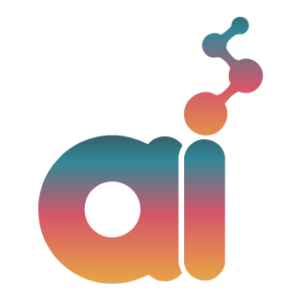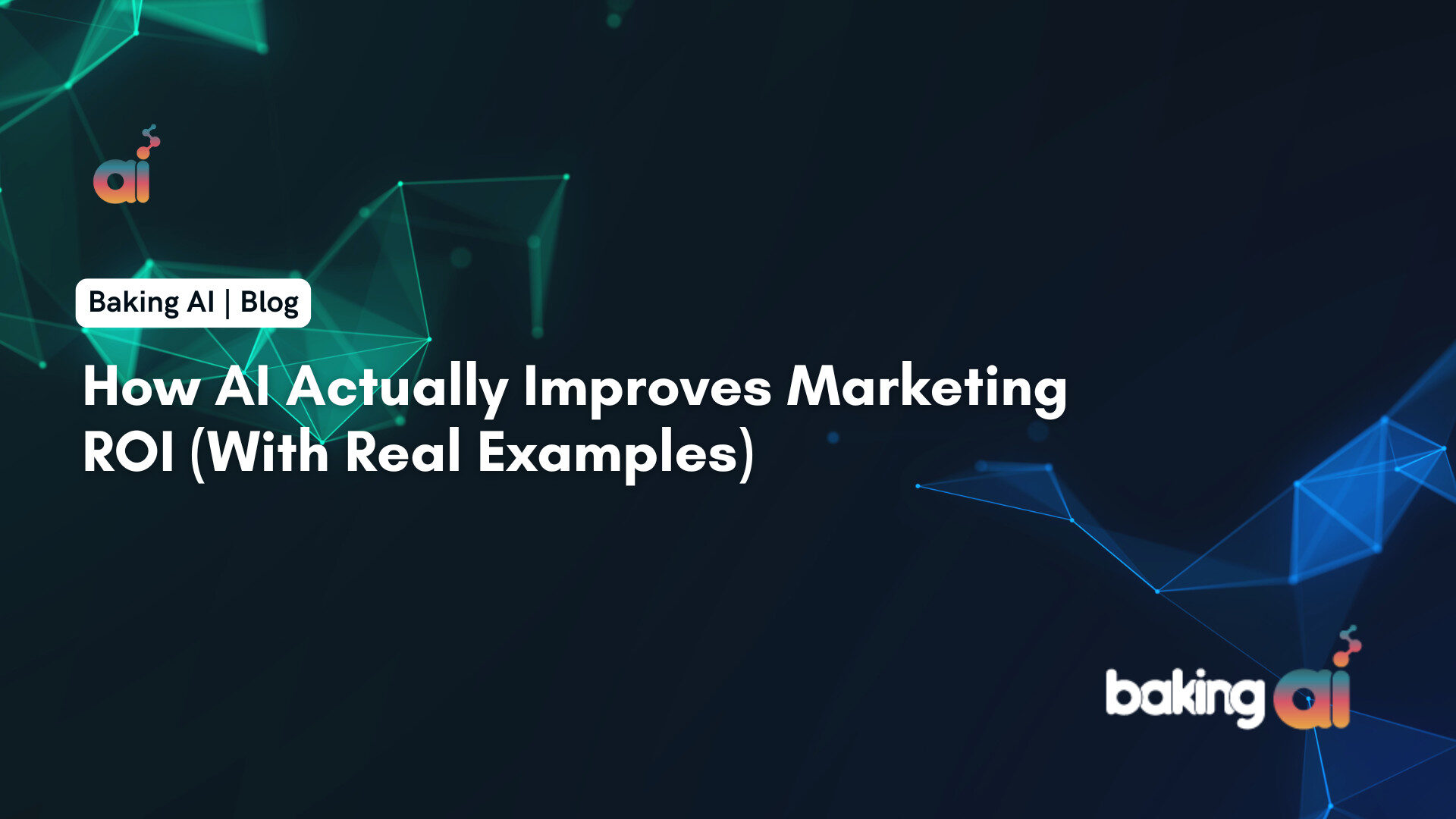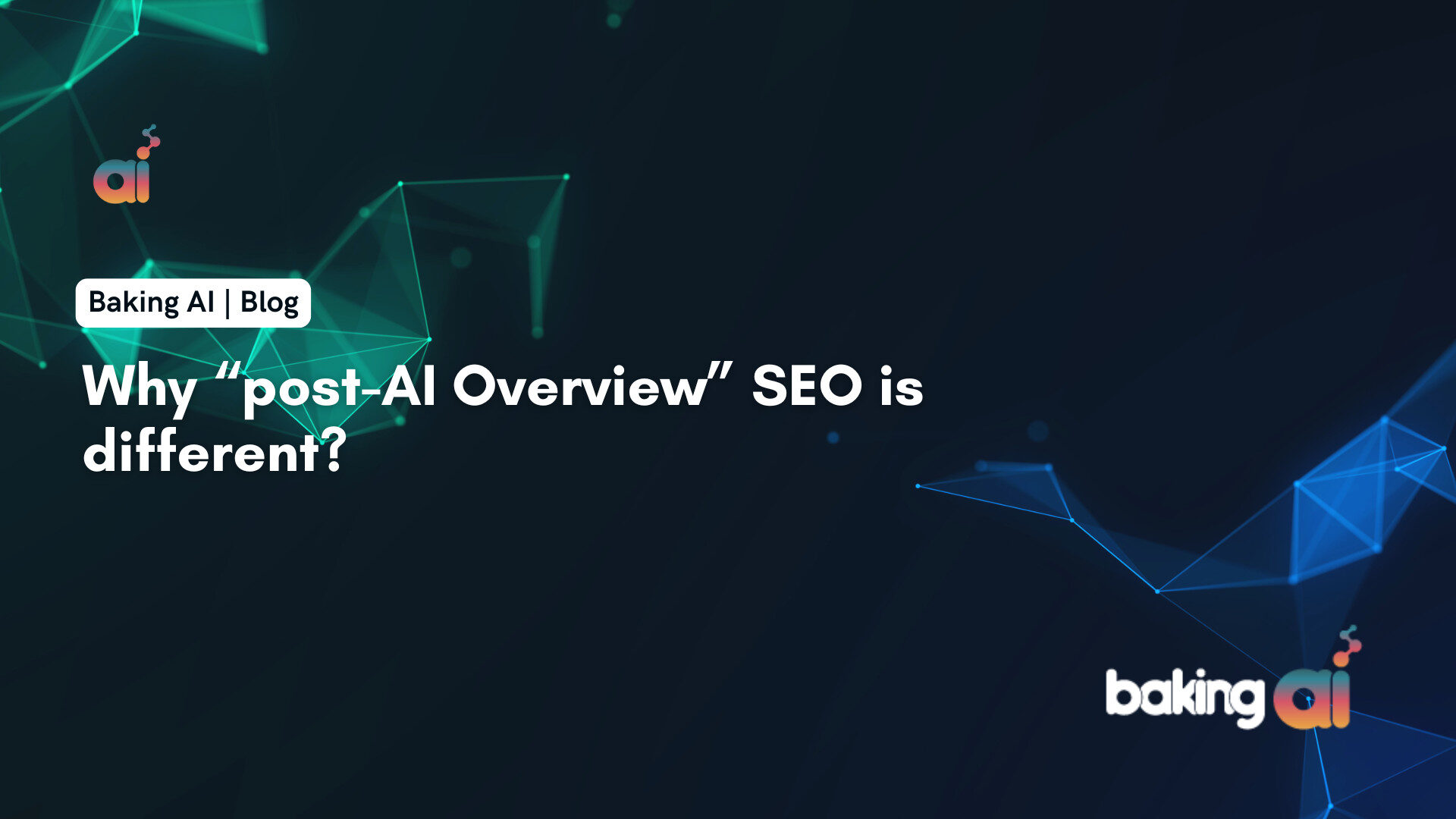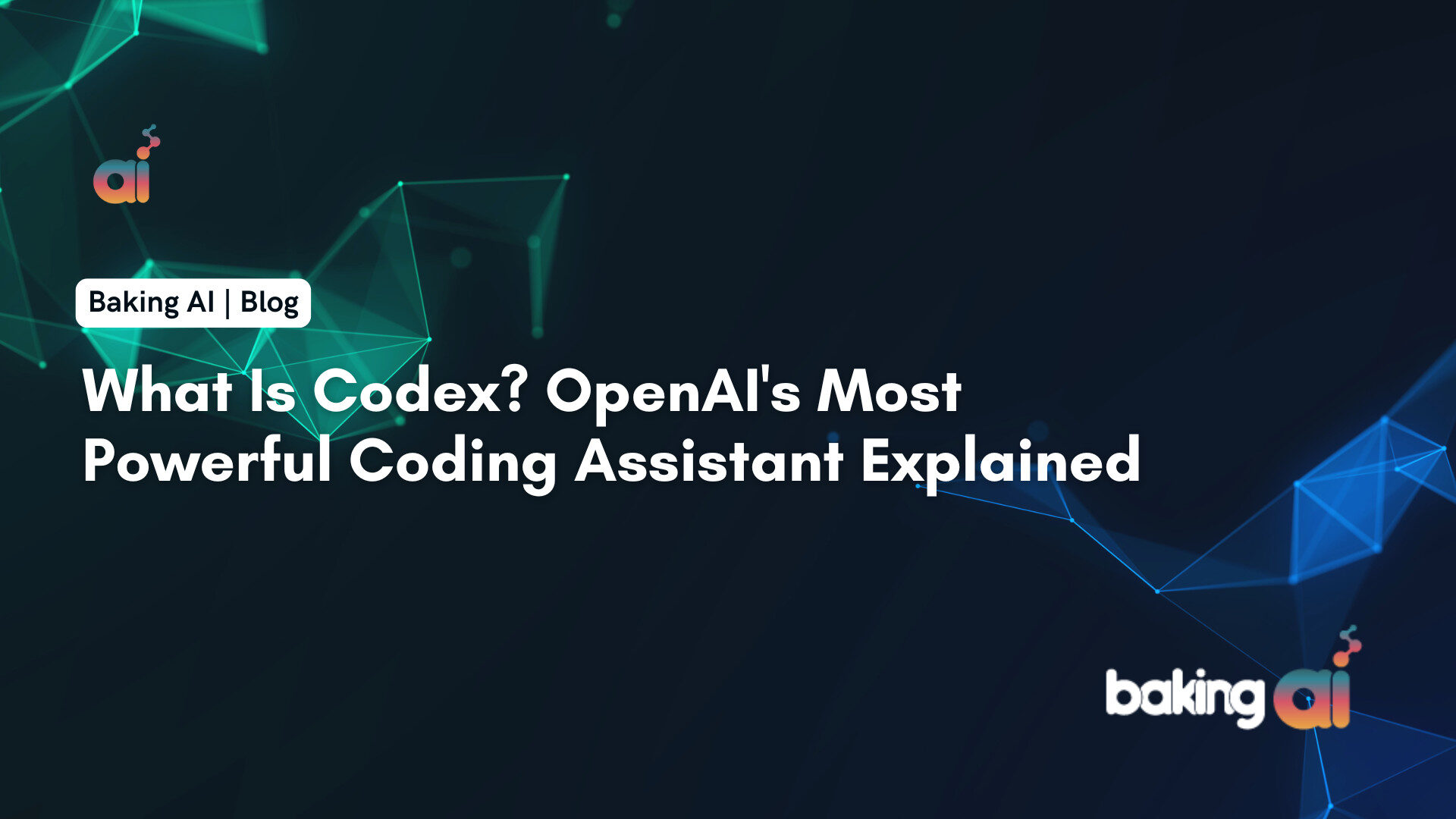Despite the fact that artificial intelligence (AI) has been in existence for some time, a number of businesses remain reluctant to embrace AI-driven methodologies.
For startup entrepreneurs, the integration of AI can be a game-changer. By grasping the extraordinary potential of AI-enabled tools, you can outpace your rivals and usher your startup into fresh realms of innovation and productivity.
Artificial intelligence is the discipline that focuses on enhancing machine intelligence. Utilizing diverse computational principles like machine learning and voice recognition, researchers have enabled machines to mimic human behavior and execute tasks resembling human actions. The practical applications of AI are limitless, ranging from spam filters and image recognition to medical diagnostics and autonomous vehicles.
Leveraging AI’s capabilities allows you to address business challenges in an effective and inventive manner, propelling your budding startup towards unprecedented levels of success and expansion.
How AI can help Startups?
Artificial Intelligence (AI) has the potential to significantly accelerate the growth of startups. According to Statista, the global AI software market is projected to reach an impressive $126 billion by 2025, indicating that this technology is not only here to stay but is also gaining popularity rapidly.
As the number of AI applications continues to grow, so does the demand for AI solutions. It’s evident that businesses will persist in investing heavily in intelligent solutions to enhance their operations.
The diverse applications of AI for startups present opportunities to invest in remarkable and highly practical products and services driven by cutting-edge algorithms.
AI can empower startups to achieve extraordinary growth by enabling them to:
- Compete with larger organizations without bearing substantial costs
- Enhance and streamline marketing and sales initiatives
- Make more profitable business decisions
- Establish a reputable brand and foster customer loyalty through superior support
- Boost productivity levels within the workplace
- Monitor competitors and strategically level up
- Identify top talent and streamline recruitment activities
Cost-Effective Competition with Larger Organizations
In the past, artificial intelligence was perceived as a specialized field, accessible only to large corporations such as Meta (formerly Facebook), Google, Microsoft, and Amazon. These companies continue to invest heavily in private AI research, exploring its vast potential. During this period, small and medium-sized enterprises could scarcely envision accessing such technology.
Fast forward to the present day. Although AI is still a largely unexplored market, it has become increasingly accessible to startups and small to medium-sized businesses. A variety of off-the-shelf AI software products and services are now readily available to entrepreneurs who lack the resources to invest heavily in AI.
The emergence of low- and no-code platforms has also played a significant role. These affordable applications have become accessible to smaller businesses, causing some high-ranking executives to express concern about the increasing availability of AI.
With appropriate initiative and drive, startups can effectively utilize AI systems, enabling them to compete with larger corporations on a level digital playing field. can be used in several ways:
- Leveraging AI Vendors and Consulting Firms: Startups can utilize AI vendors and consulting firms to implement AI without the need for large teams or substantial investment. This allows them to access the benefits of AI technology without the associated costs that larger corporations often bear.
- Optimizing Business Operations: AI can be used to enhance various aspects of business operations, such as product development, market analysis, and supply chain management. This can lead to improved efficiency and productivity.
- Enhancing Customer Engagement: AI tools can help startups understand their customers better and provide personalized experiences, thereby improving customer satisfaction and loyalty.
- Improving Talent Management and Recruitment: AI can streamline the recruitment process by identifying suitable candidates, thereby saving time and resources.
- Financial Management: AI can also aid in financial decision-making by providing accurate forecasts and risk assessments.
- Access to Boxed AI Software Products and Services: Today, there are numerous boxed AI software products and services available that are affordable for startups. These products provide startups with access to advanced technology that was once only available to large corporations.
- Leveraging Low- and No-Code Platforms: The rise of low- and no-code platforms has made AI technology more accessible to startups. These platforms allow startups to implement AI solutions without the need for extensive coding knowledge.
Boost marketing and sales
AI provides valuable solutions for startups to enhance their online presence and optimize marketing and sales. AI-driven tools leverage predictive analytics and natural language processing (NLP) to engage customers effectively. They aid content creation, offer automation, and assist with CRM, email marketing, social media management, and advertising campaigns. AI-powered recommendation engines analyze customer behavior to convert leads.
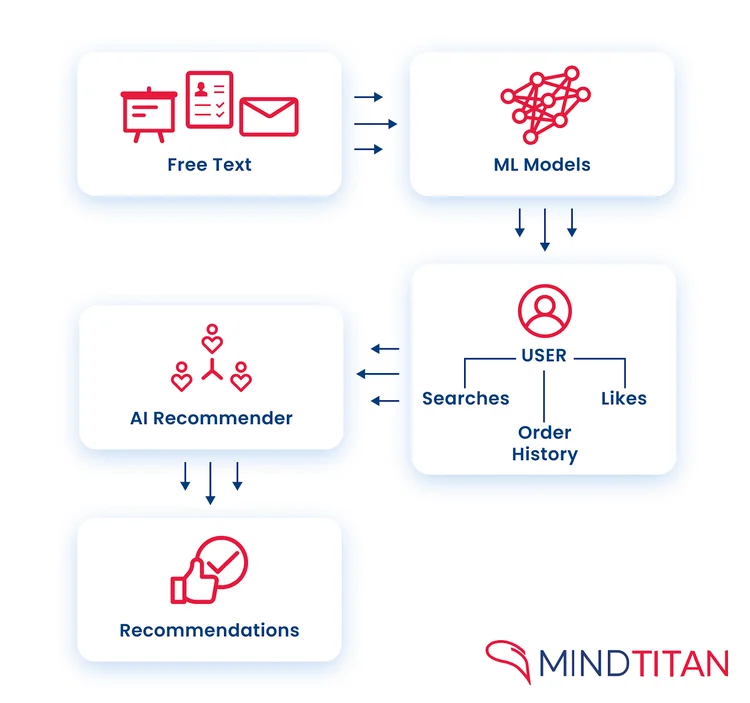
Many of these tools offer cost-effective options for startups. It can significantly boost marketing and sales for startups in several ways:
- Analyzing Customer Data: AI tools can help analyze customer data to understand their behavior and preferences.
- Predicting Future Trends: AI can predict future trends based on historical and current data, allowing startups to stay ahead of the curve.
- Automating Processes: AI can automate various tasks, freeing up time for the sales team to focus on selling.
- Personalizing Customer Experiences: AI can create personalized experiences for customers, enhancing customer satisfaction and loyalty.
- Improving Sales Planning: AI-based insights and predictive intelligence can enhance the sales planning process.
- Increasing Job Satisfaction: By automating mundane tasks, AI can increase job satisfaction among the team.
- Competing with Larger Organizations: AI allows startups to compete with larger organizations without incurring high costs.
- Making Profitable Business Decisions: AI can help make better, more profitable business decisions.
- Establishing a Brand Name: AI can help establish a well-respected brand name and encourage customer loyalty by offering better support.
- Targeting Consumers: AI helps in writing pitches and targeting messages more narrowly to a prospect’s particular circumstances
Connecting with Customers
Customer retention is often overlooked but vital for business growth. Recent AI advancements, like conversational AI and chatbots, provide 24/7 customer support, reducing costs and offering immediate responses. Voice and mobile assistants, such as Siri and Cortana, enhance customer experiences through speech recognition and personalization.
AI systems can efficiently decide when to involve human agents, leading to better customer experiences, improved satisfaction, and cost savings for startups. Startup’s ability to connect with customers in several ways:
- Personalized Customer Experience: AI can help startups deliver a top-notch customer experience. AI solutions offer cost-effective support through chatbots and other customer-facing service options.
- Understanding Customer Needs: AI-powered tools can analyze customer data, predict future trends, and create personalized experiences for your customers.
- Improved Communication: AI can teach computers to respond as team members would, ensuring that the type of communication, delivery mechanism, and message is on point.
- Content Tailoring: AI can help determine specific customer needs and recommend content to educate them.
- Intelligent Recommendation Engines: These systems use AI and machine learning to carefully study your target market’s behaviors and then suggest results with a higher probability of lead generation and conversion.
- Chatbots for Landing Pages: AI can be used to create chatbots for landing pages to engage with visitors, answer their questions, build confidence, and see a higher conversion rate.
Enhancing Employee Productivity and Efficiency
According to a study by Accenture and Frontier Economics, developed countries are expected to see a 40% increase in workforce productivity by 2035. This increase is driven by the adoption of AI in various business operations, which helps automate repetitive tasks, enabling employees to focus on their core skills and boost efficiency.
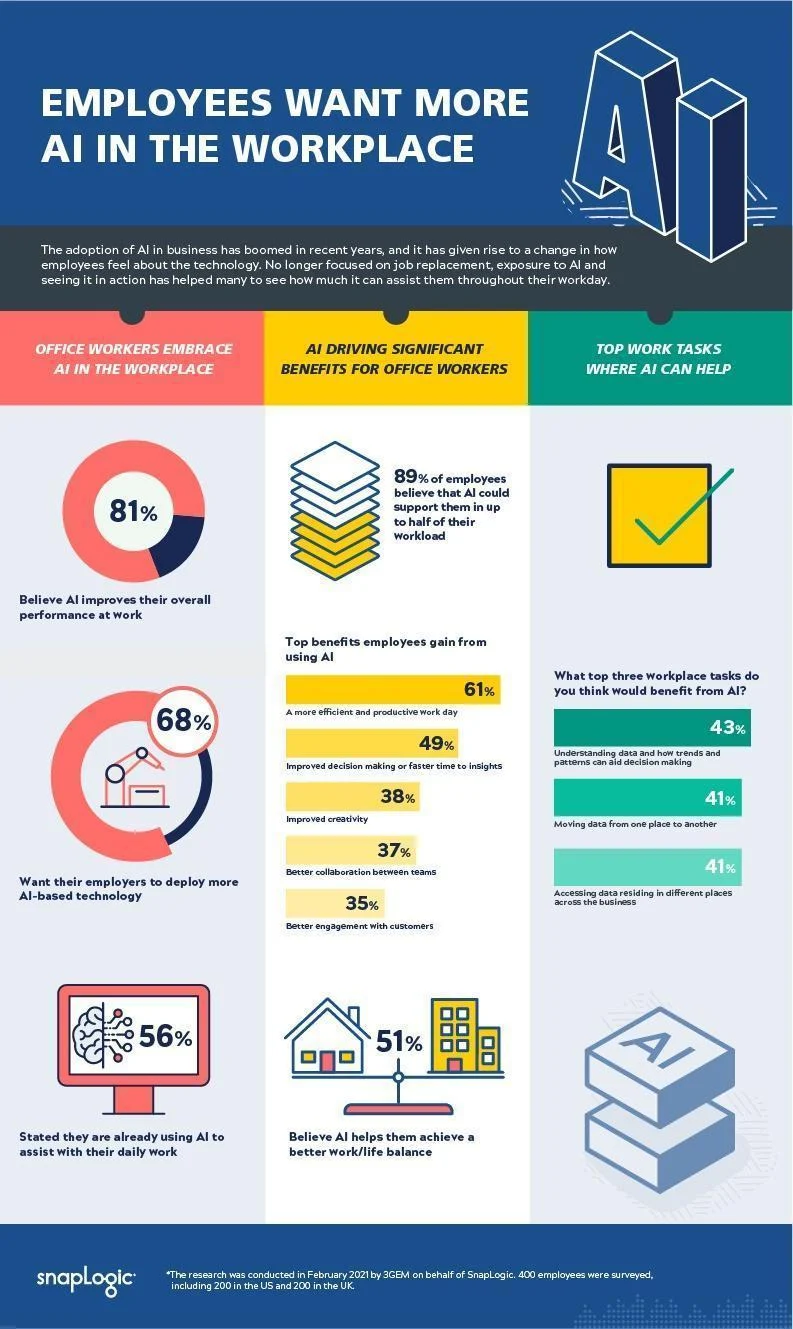
A survey by 3Gem for SnapLogic revealed that both employers and employees see AI as a transformative force, with a majority of participants wanting more AI integration in the workplace. This trend underlines AI’s potential as a game-changer for businesses and workers. Startup’s can enhance productivity and efficiency in several ways:
- Automating Routine Tasks: AI can automate routine tasks, thereby freeing up employees to focus on more complex and strategic tasks. This not only increases productivity but also improves employee satisfaction.
- Improving Decision Making: AI can provide advanced business analytics, helping startups make informed decisions that can lead to improved efficiency.
- Enhancing Employee Performance Tracking: AI can accurately track employee performance, ensuring that jobs are carried out by those best suited to them, which boosts overall productivity.
- Facilitating Better Work-Life Balance: AI has the potential to create a better work-life balance by automating tasks and reducing workload, which can lead to increased employee satisfaction and productivity.
- Disseminating Knowledge: AI can help disseminate the potentially tacit knowledge of more able workers and help newer workers move down the experience curve.
- Optimizing Workflows: By training employees to develop superior software through refining prompts, organizations can simplify scaling and systematizing processes by converting prompts into code.
Recruiting Top Talent and Effective Management
A successful business, regardless of its size or industry, relies on a skilled workforce. For startups, a high-quality talent pool is crucial to make a strong market entry. Artificial intelligence has revolutionized recruitment, making it faster and more efficient. AI-driven platforms analyze data from both employers and applicants to match the best candidates to job roles.
Tools like ZipRecruiter’s Phil offer candidate suggestions and evolve with user feedback. Pymetrics uses psychometric data to assess candidates through games and improve hiring accuracy. HRM tools help startups monitor employee performance and engagement. The best part is that these resources are accessible even for businesses without a dedicated HR department.
Artificial Intelligence (AI) can significantly enhance a startup’s ability to recruit top talent and manage it effectively in several ways:
- Bias-Free Hiring: AI can help companies remove bias in the hiring process, making it more inclusive and faster. It can recognize bias-based language to identify potential issues with diversity, age, or ethnicity.
- Efficient Recruitment: AI can speed up hiring by identifying roadblocks and time gaps and assigning candidates to an individual to push them through the process. It also identifies an individual’s skill sets and enables organizations to identify what adjacent skills are needed for the roles they’re trying to fill.
- Skill Gap Identification: AI can help identify employee skill gaps or whether specific roles are a good fit for someone. It suggests education and experiences for each of our employees so that they can build their skills for the future as they have their current job.
- Automated Candidate Search: AI chatbots, trained on candidate profiles, help hiring managers find and recruit employees. A human recruiter provides the AI with specifications like “experience working with ChatGPT-like products,” and “technical experience at a top tech company” to find suitable profiles.
- AI-Enabled HR Platforms: There are now dozens of AI-enabled HR and recruiting platforms available for startups to help identify the right hires among a large pool. Once hired, AI tools can help detect employee engagement, at-risk employees, or how productive your developers are, enabling you to build a highly functioning company.
- Automating Recruitment Tasks: Many solutions enable you to leverage artificial intelligence to automate recruitment tasks and accelerate hiring workflows through standardized processes.

